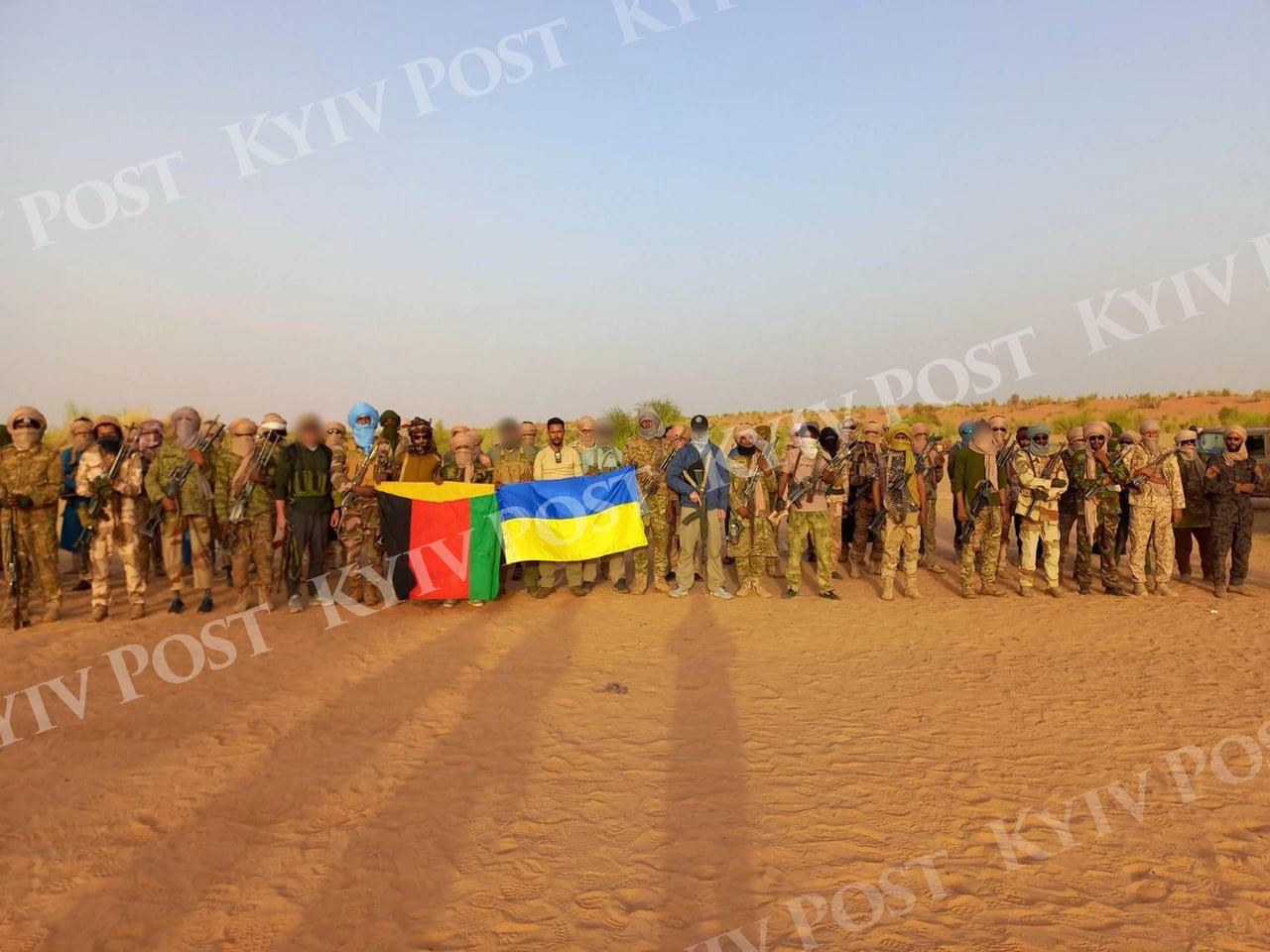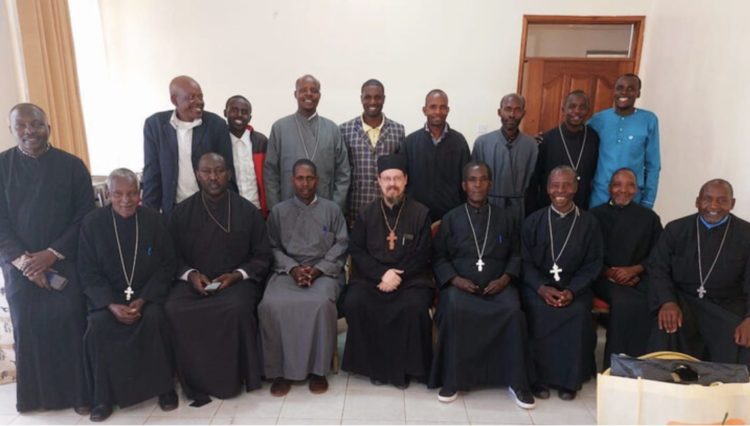Russia’s Wagner mercenaries have possibly suffered their largest losses in Africa ever: on 28 July, Mali’s Tuareg rebels claimed a victory over government forces and the Russian paramilitaries helping them.
Ukraine's intelligence agency announced that the Tuareg rebels received help – “information and not only information” – from Ukraine and announced other operations against Wagner in Africa to come.
Ukraine’s aid was, apparently, central to the victory of the rebels seeking autonomy for the Azawad region in northern Mali against the Wagner mercenaries, who, since 2021, have been supporting the military junta that seized power one year prior.
After years of battling Wagner, the Ukrainian army is uniquely positioned to defeat one of Russia’s most feared private military companies in Africa, where it helps the Kremlin prop up authoritarian regimes in exchange for resources and influence.
In the Mali incident, up to 80 Wagner fighters were killed, marking the group's largest single-day loss on the African continent since beginning operations there.
Even if it’s less than 80, it is a highly significant loss for Wagner, Dr. Omar Ashour, security analyst, non-resident defense senior fellow at the Ilko Kucheriv Democratic Initiative Foundation, and author of the book “How ISIS fights,” told Euromaidan Press: “We're talking about a small company size - if you lose one in one operation, that's a big loss. Furthermore, these are elite soldiers, not the regular forces. They are advisors, trainers, the special force detachment.”
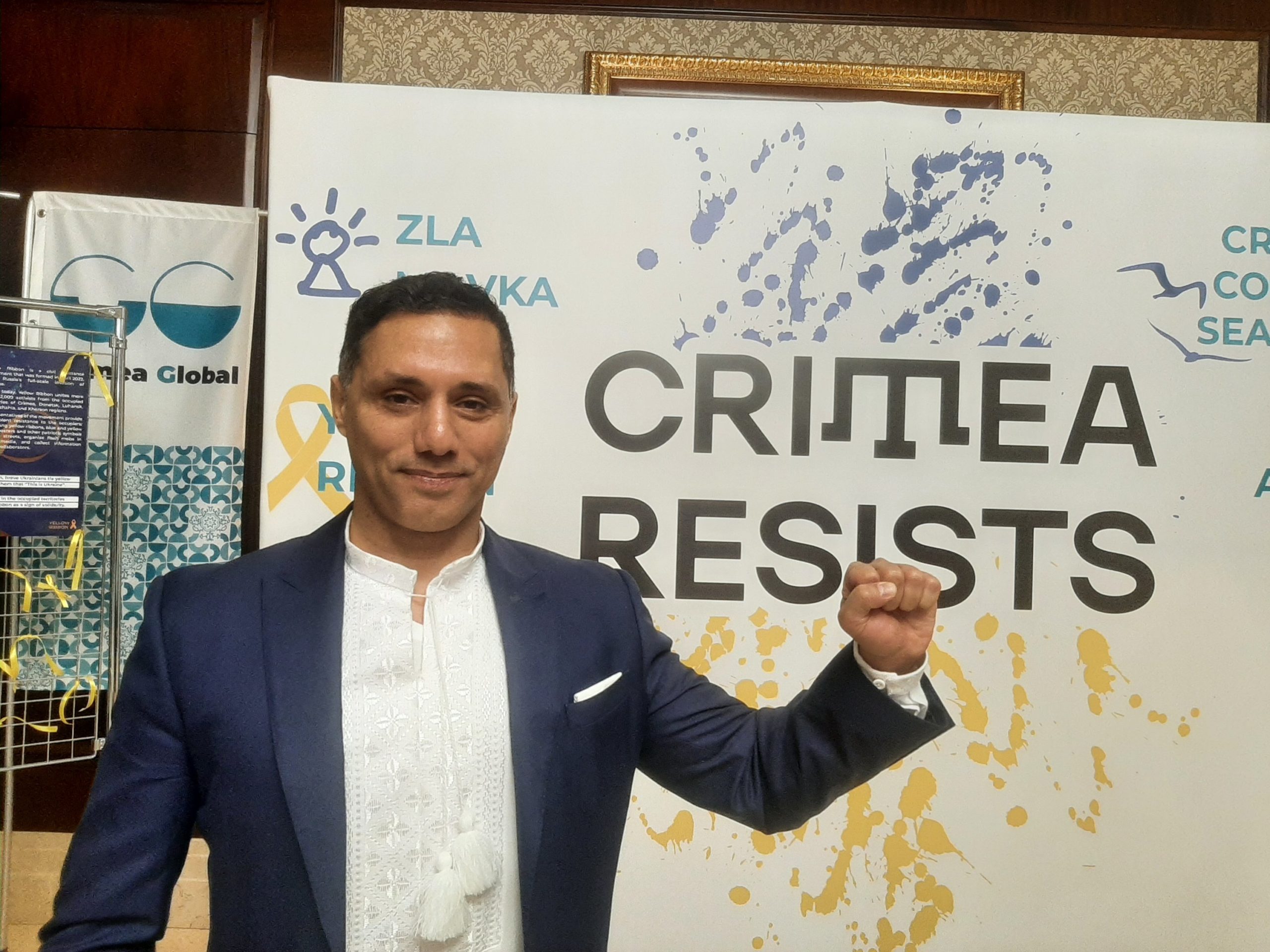
However, in Ukraine, Wagner had comparable losses daily, with the highest confirmed toll reaching 213 in a single day, according to Ukraine's Center for Strategic Communications. During the six-month battle for Bakhmut, over 20,000 Wagner troops were killed, and even more were wounded.
We talked to Dr. Ashour to understand the meaning of Ukraine’s new African theater of war amid the ongoing Russian invasion.
Russia’s Wagner strategy in Africa and the Ukrainian response
In the conflict zones of Africa’s poorest nations, Russia offers military support and security to factions representing authoritarianism, corruption, and repression in exchange for extracting usually either gold, diamonds, or other minerals, turning these resources into missiles, rockets, and artillery shells that it then launches at Ukraine, Dr. Ashour tells.
Wagner is paramount to this strategy. Its operations in Africa were well-documented in the report “Blood Gold,” which estimates that by exploiting gold mines in Mali, Sudan, and the Central African Republic, the Kremlin has obtained over $2.5 billion in gold from Africa since Russia’s 2022 invasion of Ukraine.
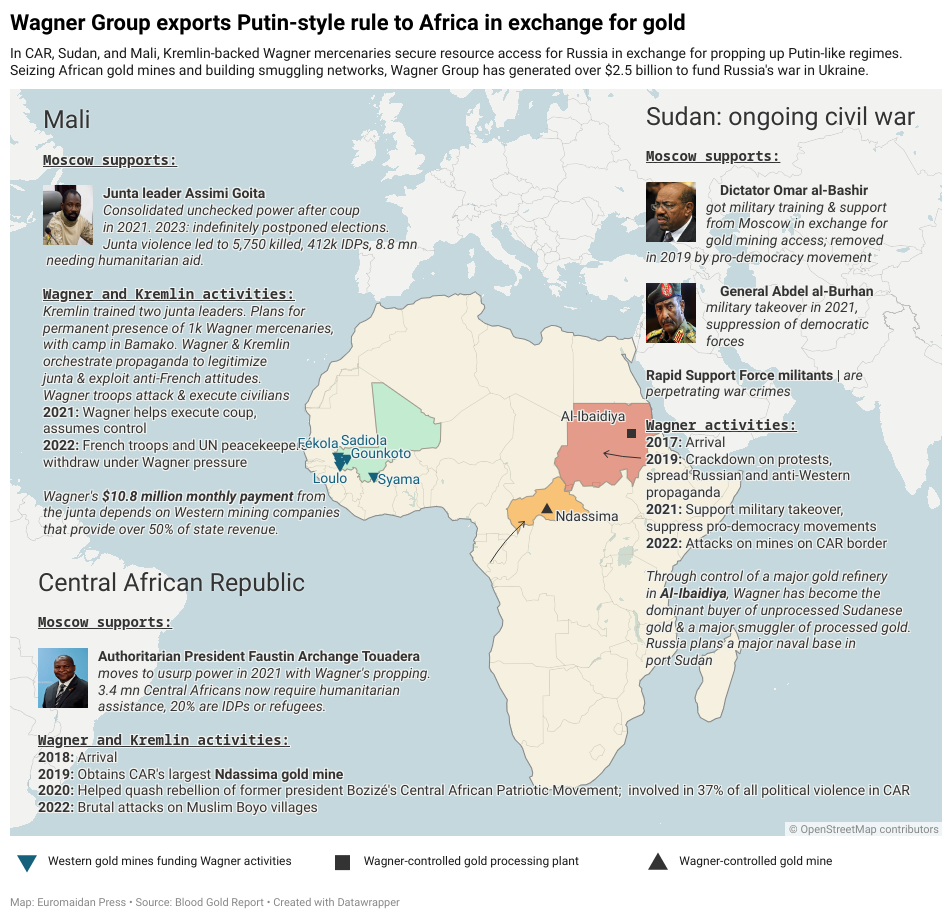
Specifically, in Mali, Wagner secured a lucrative cash-for-security deal with the ruling junta around 2021, reportedly receiving $10 million monthly. This deal is largely funded by taxes from international mining companies operating in the country.
Wagner has also been noticed in Libya, Mozambique, Madagascar, Burkina Faso, and Niger.
Meanwhile, Ukraine has been spotted helping anti-Wagner battles, most recently, in Mali, and in 2023-2024 in Sudan, where Ukrainian operatives provided intelligence and support to the Sudanese Armed Forces, conducted precision strikes and other military actions against Wagner units, including disrupting logistics and supply lines. There were also reports of Ukrainian intelligence activities aimed at dismantling Wagner’s economic operations, particularly in gold mining.
“Strategically, there is a clear shift in the Ukrainian security strategy in areas where the Russian Federation is trying to exert influence and extract resources, and therefore by default undermine Ukraine,” Dr. Ashour believes.
Although thus far, Ukraine’s strategy was more of a reaction to Russia’s actions, it will eventually become more active, Ashour says:
“Ukraine realized that the fight is not just in Europe. The world is not only Europe. Europe can put all kinds of pressure on Russia, and they will evade and find allies elsewhere – in Africa, South America, India, China, and the rest of Asia. This will basically undermine whatever Europe is trying to do.
So Ukraine will then have to expand and increase the number, quantity, and quality of its friends globally. The fight, unfortunately, is global now. You cannot limit it to one theater. Therefore, this is part of the overall global strategy for the defense of Ukraine that involves as many friends, partners, and allies as possible, even in countries where Russia is operating. You cannot just leave them for Russia: this will undermine the security of Ukraine and afterward. the security of Europe.”
Russia exploits its Soviet-era connections and influence to court African countries, but Ukraine is equally well-positioned to engage with these regions, as it has quite a few military and security links to Africa from those times as well.
“Some of the officers I interviewed for other pieces of research in places like Algeria and Egypt were trained by Ukrainian intelligence officers, air defense officers, or artillery officers,” Ashour adds.
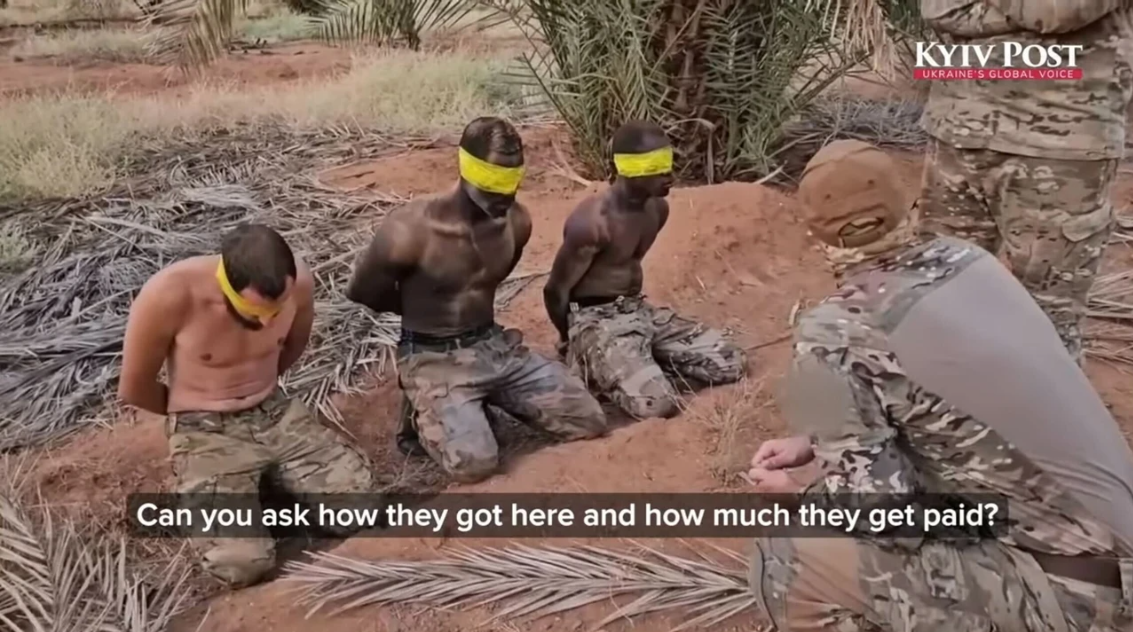
Intelligence, training, weapons: how Ukraine helps fight Wagner in Africa
Ukraine’s participation has been noticed in two locations: Sudan, where Ukraine supports the government forces against Russia-aided paramilitaries, and now, most recently, Mali, where Ukraine aids anti-government rebels fighting against the Wagner-backed junta.
Either Ukrainian officials have mentioned the assistance, or the helped groups have publicly thanked Ukraine, such as the Sudanese special forces, which sent greetings to Ukraine’s intelligence chief Kyrylo Budanov on his birthday.
Ukraine could have selected Sudan and Mali for anti-Wagner actions due to the significant resources that these countries provide the Kremlin, Dr. Ashour believes. In Sudan, Wagner gains access to vast amounts of gold through smuggling operations, and Mali pays Wagner a reported $10 million monthly, half of which is provided by Western mining companies operating in the country. But it’s also about finding the right partners: apparently, in Sudan and Mali, Ukraine succeeded in finding allies.
What specific aid could Ukraine have given? Intelligence support and training are two major options.
Intelligence includes information about the units of the Wagner group, their training, their movement, how they fight, what type of tactics they use, their techniques, tactics, and procedures, and some of the weapons systems. As well there is apparently some support in terms of weapon systems like MANPADS, ATGMs, and perhaps also some drone tactics and drone surveillance, Dr. Ashour believes – however, these are still unconfirmed reports.
In the words of Ukrainian military expert Oleksandr Musienko, to prepare their ambush, the Tuareg rebels needed to know beforehand about the movements of the convoy, and to neutralize it so quickly, they needed to be trained. Moreover, Ukraine is likely gathering intelligence on the actions of the Wagner contingent in Africa, Musienko believes:
”The objective is quite simple: to push out Russian presence from Africa, to elevate the image of the Ukrainian state, and to demonstrate that it's not worth turning to Wagner mercenaries as they are unreliable. Consequently, this would reduce the opportunities for earning money that later goes towards financing various military actions against Ukraine."
Potential for changing the regional security dynamics
Trending Now
The 28 July clash on the border with Algeria marked a successful outcome of the rebels’ largest engagement with the Mali government yet. The Malian autonomy rebels have had localized clashes with the central government between 2012-2021. Skirmishes intensified following the coup and Wagner’s arrival to prop up the junta, and the recent battles indicate an escalation in both the intensity and scale of the conflict.
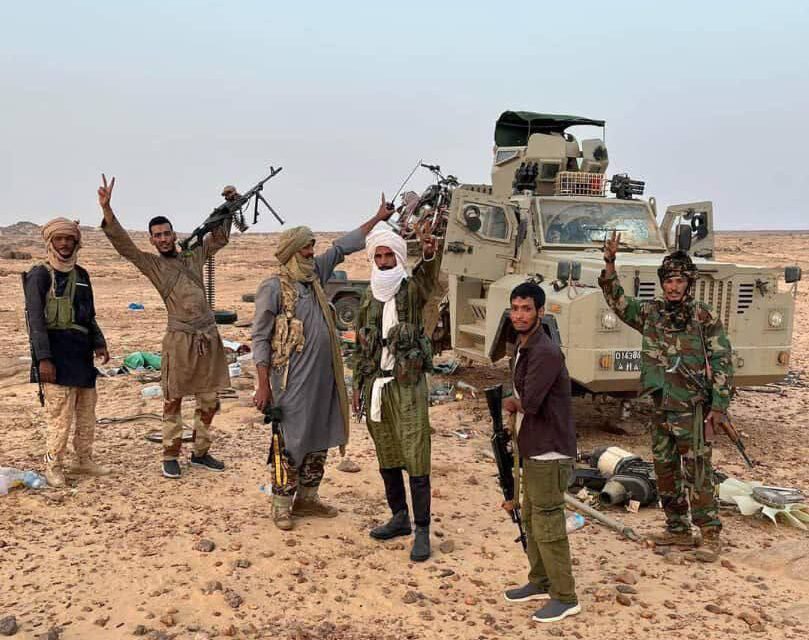
Will the tactical victories for Tuareg rebels, with substantial losses for Wagner and Malian forces, alter the course of the conflict?
Omar Ashour believes it’s too early to tell – it takes a series of battles to change the war. But the battle will change two things:
- undermine the trust of the Malian rulers in the assistance of the Wagner group
- send a strong message that they cannot rely on Russia and on the Wagner group to support them.
“Russia has a very serious conflict where it is endangering others, and on top of that the war with Ukraine. And therefore, Russia’s victims will not allow Russia to extract more resources so it will hit them with these resources. You would be up against Ukraine, and Ukraine has also friends in the region,” Omar Ashour said.
This success could also encourage other African groups, whether government forces or rebels, to either fight against Wagner or contemplate such actions.
This situation is clearly exemplified in Libya, a country with a highly strategic location in the Mediterranean that faces Europe and has abundant wealth. Despite being in the midst of a civil war, Libya has successfully resisted Wagner's attempts to expand its influence.
In 2019, the Wagner group tried to assist in taking over the capital but failed. The Libyan government clearly opposes the Russian Federation and the Wagner group. Dr. Ashour believes this case demonstrates that both legitimate governments and groups fighting against dictatorships can effectively resist Wagner's incursions, potentially inspiring similar resistance elsewhere in Africa.
Ukraine puts Wagner in a difficult situation
The Institute for Study of War suggested that Russia could supplant the Wagner losses in Mali with fighters of the African Corps, who were deployed to Ukraine to participate in Russia’s offensive attempt in Kharkiv Oblast. The ISW believes that Russia has no goal of fully supplanting Wagner’s losses in Mali or elsewhere, but Dr. Ashour disagrees: Ukraine now put Russia in a very difficult situation:
“If they withdraw the units from Mali, they lose their resources, as the payment won't come, whether in gold or in cash or in diamonds. If they keep the forces now, some of them are going to get killed. This undermines morale: Africa was always seen as a good option for leaving the battlefield in Ukraine: less risky, and you’re making money. And now it’s not that safe anymore, and also the cash could dry up: why would they pay you if you're getting killed there without doing the job?”
Dr. Ashour says Russia will likely need to withdraw some powerful units from Ukraine and put them in Africa to stabilize the situation and keep the cash and gold flows going.
The importance of cooperation in tackling Wagner and Russian aggression
Omar Ashour emphasizes the growing significance of armed non-state actors in global conflicts. While these groups often operate outside traditional legal frameworks, their effectiveness cannot be ignored.
"We understand now how important the armed non-state actors are, whether for good or for bad," Ashour notes. He points out that such groups can range from organizations like Hezbollah in Lebanon to the Rapid Support Forces in Sudan.
Ashour explains that the impact of these groups depends largely on their affiliations. While some, like the Wagner Group, become instruments of "corruption, authoritarianism, and further repression," others can be potential allies in opposing Russian aggression.
The expert highlights that states are increasingly engaging with these non-state actors to extend their strategic influence. However, he cautions against viewing them as simple proxies, citing the example of Yevgeny Prigozhin's occasional defiance of Russian military command.
"You can rarely control them," Ashour states, explaining that most armed non-state actors operate semi-autonomously. Nevertheless, he suggests that finding common ground with groups opposing Russian aggression could potentially serve Ukraine's long-term strategic interests.
"You will find usually either common interests or common ideas or fighting the same enemy," Ashour concludes, implying that cooperation with such groups could be a valuable strategy in countering Russian influence and aggression in Africa and beyond.
Ukraine as a potential regional power
With its involvement in Sudan and Mali, Ukraine is gaining allies in unexpected places. Sustaining these relationships could gradually transform Ukraine into a regional influencer and player. Ashour draws parallels with Soviet strategic thinking, which viewed the region from the Baltics to the Mediterranean and even the Red Sea as a single, multi-front theater, with each front supporting the other.
He elaborates on this strategy: "If I want to pressure the West in Syria, I escalate in the Donbas just to serve my interests in Syria. And the other way around. If I want to extract some money and funds from Africa just to support my troops in the Donbas, then I do it again."
Ashour argues that Ukraine should adopt a similar approach, because “it's an effective way to do it.” Focusing solely on one front could allow Russia to expand its resources and strategic influence at Ukraine's expense. Potentially, it is the way to establish Ukraine as a regional power, and even international power, he asserts.
Correction: A previous version of this article stated that the clash of the Tuareg rebels took place on the border of Mali with Angola. In fact, it took place on the border with Algeria.
Related:
- Dozens of Wagner mercenaries, their local allies killed by Tuareg fighters in Mali
- Why Russia fights like ISIS and how to de-Putinize liberated youth
- Media: Ukrainian forces operate against Wagner mercenaries in Sudan
- Blood Gold: How Kremlin mercenaries loot Africa to wage war in Ukraine
- How Wagner Group exports Putin-style rule to Africa

